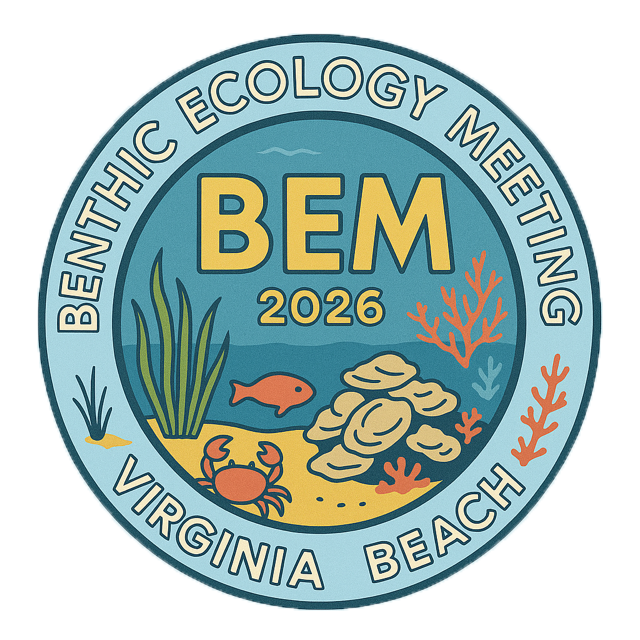Abstract Submission
Abstracts must be submitted by Friday, February 6, 2026
Abstracts must include the following information:
- Presentation title
- Co-authors and affiliations
- Abstract (200 word max)
- 3 keywords
- Session topic (rank top 3)
Register First
All presenters must register for the conference before they can submit an abstract. After the registration form is received and processed, you will get an email with a link for abstract submission. from no-reply@oxfordabstracts.com with the subject line "You're registered for 54th Benthic Ecology Meeting Society". This email will contain a link to submit your abstract, as shown below
 If you don't see the email in your inbox within 24 hours, please check your spam folder before contacting us at bem2026@vims.edu.
If you don't see the email in your inbox within 24 hours, please check your spam folder before contacting us at bem2026@vims.edu.
Session Topics
- Anthropogenic Impacts
- Aquaculture
- Benthic Monitoring
- Biodiversity
- Biological Invasions
- Climate Change
- Community Change
- Community Ecology
- Ecosystem Ecology
- Population Ecology
- Macroecology & Biogeography
- Fisheries
- Deep Sea Ecology
- Coral Reef Ecology
- Oyster Reef Ecology
- Seagrass Ecology
- Recruitment and Larval Ecology
- Trophic Relationships
- Chemical Ecology
- Restoration Ecology
- Ecophysiology
- Stability across scales in marine and estuarine ecosystems (special session)
- Using photogrammetry as a tool to monitor benthic ecosystems (special session)
- From Spatial Pattern to Ecological Process: Seascape Controls on Ecosystem Functioning (special session)
- Altered patterns and functioning in degraded reef environments (special session)
- Environmental impact on benthic communities: effect(s), response and recovery time (special session)
About the Special Sessions
Stability across scales in marine and estuarine ecosystems
Marine and estuarine ecosystems vary through time and space, yet the stability of their populations, communities, and ecosystem functions underpins fisheries management, restoration planning, and conservation success. This session explores the causes and consequences of ecological stability across spatial, temporal, and taxonomic scales in benthic systems. The session encourages submissions of empirical, experimental, or theoretical studies that examine how variability, synchrony, and biodiversity shape stability from local habitats to regional meta-ecosystems.
Keywords: stability, variability, synchrony, biodiversity, ecosystem function
Convener: Max Castorani (University of Virginia)
Using photogrammetry as a tool to monitor benthic ecosystems
Advances in structure-from-motion photogrammetry has been a revolutionary tool that allows researchers to generate detailed 3-dimensional models and large area ortho-images that allow for unprecedented insights into spatial and temporal patterns of benthic communities and ecological processes. This technology has been applied to underwater ecosystems with great success for many applications, such as habitat mapping, restoration monitoring, modelling demographic trends, and analyzing community structure and function. This session emphasizes how these tools are transforming our ability to quantify ecological processes and assess coastal ecosystem changes across scales.
Keywords: Photogrammetry, benthic ecology, monitoring, spatial scales, habitat complexity
Conveners: Hannah-Marie Lamle, Rolando O. Santos, Nicolas Rivas (Florida International University)
Spatial Pattern to Ecological Process: Seascape Controls on Ecosystem Functioning
Seascape properties fundamentally regulate ecosystem processes that sustain marine productivity, nutrient cycling, and resilience. A powerful approach to understanding these relationships is examining how spatial configuration, connectivity, and heterogeneity of marine habitats drive ecosystem metabolism, biogeochemical fluxes, and functional diversity. To advance our understanding of how seascape structure governs ecosystem functioning, our session will focus on current research linking habitat composition and configuration to ecosystem functions including primary production, nutrient dynamics, carbon sequestration, and energy transfer in coastal and marine systems experiencing rapid environmental change.
Keywords: Seascape properties, habitat connectivity, ecosystem services, marine spatial ecology, habitat heterogeneity
Conveners: Gina A. Badlowski, Alia Jones, W. Ryan James, Rolando O. Santos (Florida International University)
Environmental impact on benthic communities: effect(s), response and recovery time
Environmental impact on the benthic compartment has various forms: pollutants, organic loads, anoxia and physical disturbance. The benthic communities can register any environmental changes, they respond to the impact, and they are reliable bioindicators for the environmental quality status. For this session all studies, spanning from shallow waters to the deep sea and exploring how environmental impact(s) affect benthic communities and their recovery, including responses in diversity, functionality, food web dynamics, and interaction between different benthic components are welcome. Submissions focused on bioindicators, modeling, development of new indices for environmental quality assessment over space and time and mitigation strategies, using molecular and morphological approaches, field and experimental studies are encouraged.
Keywords: Impact assessment, bioindicators, diversity, functionality, spatial-temporal scale(s)
Conveners: Elisa Baldrighi, Yazmin Gonzalez Elizarrara, Jeffrey G. Baguley (University of Nevada, Reno)
Altered patterns and functioning in degraded reef environments
Coastal marine ecosystems are rapidly transforming under anthropogenic stressors, including sedimentation, eutrophication, and climate change. Across degraded regions, coral reefs with < 5% coral cover are dominated by sediment-laden algal turfs, reduced herbivory, and declining diversity: hallmarks of non-coral alternative stable states. This session explores "modern benthic communities", examining stressor-driven dynamics, recovery potential, and regional variability in spatial-temporal gradients across community composition, resilience, and ecological interactions. Submissions addressing biogenic reef habitats, especially coral reefs (but also rocky reefs, oyster reefs, etc.), are encouraged. The session welcomes theoretical, observational, and experimental studies, especially from students and early-career researchers.
Keywords: community dynamics, stable states, ecosystem function, coral reefs, degradation pathways, resilience
Conveners: Tory Chase (Skidmore College) Nicholas Jones (Nova Southeastern University)
